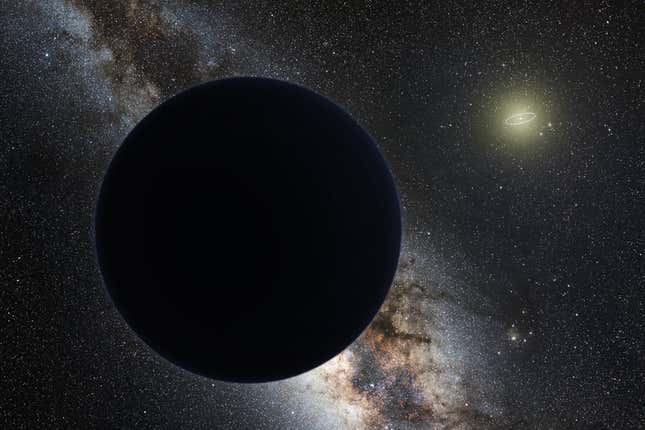
Five years ago, a couple of astronomers declared they had found evidence for another planet in our solar system, a so-called “Planet X.” Though now commonly referred to as Planet Nine, the cosmic object—much bigger than Earth and lurking somewhere in the solar system’s outer reaches—is still very much theoretical, though the same pair has now fine-tuned the likely orbit such a planet would take.
The new research comes from Mike Brown and Konstantin Batygin of the California Institute of Technology. Brown is “the guy who killed Pluto and is proud of it,” as Gizmodo described him in 2016. Currently hosted on the pre-print server arXiv and accepted for publication in the Astrophysical Journal, the research states that, should Planet Nine exist, it is closer and brighter than previously thought.
Scientists suspected the existence of an unknown planet based on the close clustering of objects in the Kuiper Belt, a wide band of icy objects beyond Neptune’s orbit. If there were an unobserved planet lurking beyond the belt, it would be the most distant orbit of any planet around the Sun, taking thousands of years to make one revolution (compared Neptune’s 164-year orbit, the longest of the known planets).
Just as Neptune was discovered in the 1840s when astronomers realized Uranus was being dragged by some unseen object, a handful of Kuiper Belt objects appear to be clustered in the same orientation in space—something that could be a random event but that some astronomers believe is due to an undiscovered planet.
Other ideas have been floated; some have suggested that Planet Nine is actually a debris ring large enough to exert similar gravitational effects to a massive planet, while others suspect Planet Nine is a primordial black hole, a theorized relic of the early universe, too small to spot with modern methods. Still others say that no such object exists.
Michele Bannister, a planetary astronomer at the University of Canterbury in New Zealand, told Gizmodo in 2017 that “The Planet 9 idea is a fun idea, it’s exciting, but it’s taking a bit of the oxygen at the moment,” and “We have this interesting problem…and the very shiny solution at the moment is called Planet 9.”
The new research was choosier in the selection of Kuiper Belt objects included to determine Planet Nine’s mass, orbit, and gravitational influence. Since some objects in the belt have orbits affected by Neptune’s gravity, their inclusion would distort the data. The final group of included objects—11 in total—were selected based on the researchers’ stringent criteria. Based on their analysis, Planet Nine would be a little over six times Earth’s mass and circle the Sun once every 7,400 years, as National Geographic reports.

The researchers also calculated the likelihood that the clustering of the orbits could be due to some other effect besides a massive object. They determined there was a 99.6% chance that some object was messing with the Kuiper Belt orbits. That’s actually a big increase in the probability of a fluke (1 in 250) from the 1-in-10,000 odds the pair drew up in 2016, as NatGeo points out.
Back then, Brown and Batygin thought that the planet was more massive (10 times Earth’s mass) and had a much longer orbit (over 10,000 years) than what’s described in the new paper. Their new assessment is that Planet Nine should be closer to the Sun—close enough, in fact, that it should be observable in the near future by the Vera Rubin Observatory, which is expected to have its first light by 2023. Fingers crossed.